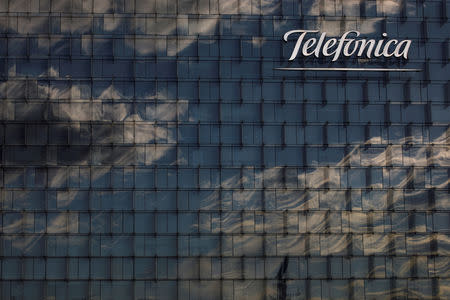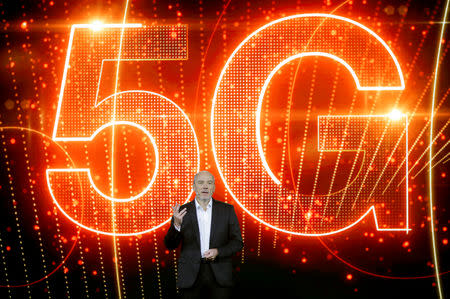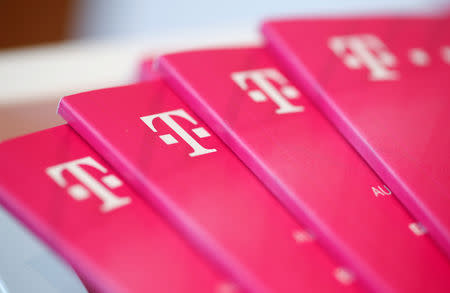European telcos face slow domestic growth, high investments
By Arno Schuetze, Mathieu Rosemain and Isla Binnie
FRANKFURT/PARIS/MADRID (Reuters) - Continental Europe's three biggest telecoms groups expect only modest profit growth this year as they face relentless competition in their home markets and investments in next-generation mobile networks and fibre broadband.
Deutsche Telekom, Orange and Telefonica forecast core profit growth of up to 3 percent for 2019, a year when costly 5G auctions will take place while mergers that could ease competition remain a distant prospect.
France' Orange and Spain's Telefonica both face competition for domestic consumers from low-cost rivals Iliad and Yoigo respectively.
Germany's Deutsche Telekom operates in an easier domestic mobile market, with three players instead of four, but is spending on broadband fibre to combat strong cable competitors.
Telefonica was the most upbeat of the three former state monopolies, speaking of "remarkable" operating momentum at the start of the year and confidence in its 2019 targets, while Orange struck the most cautious tone.
"Today's competitive environment has intensified and shows no sign of waning, so it inevitably has an impact on our capacity to generate growth," Orange Chief Financial Officer Ramon Fernandez said, referring to the French business.
Telefonica's Chief Executive Jose Maria Alvarez described its guidance as "prudent" and said it implies that the profit margin will remain stable.
Orange shares were down 1.5 percent, Deutsche Telekom down 0.2 percent and Telefonica shares up 0.1 percent by 1323 GMT.
Orange raised its dividend by 5 cents to 0.70 euros per share but said it could not see far enough ahead to guarantee a rise next year. Deutsche Telekom also raised its dividend by 5 cents to 0.70 euros, while Telefonica kept its dividend flat at 0.40 per share.
Investors prize telecoms companies largely for their dividends, which tend to be generous thanks to the companies' strong cash flows, rather than for any growth prospects.
Years like 2019 in which 5G spectrum auctions and other capital expenditure compete strongly for cash with shareholder payouts are particularly challenging.
Thursday's guidance may fuel scepticism shown by investors over the past few months about Europe's telecoms sector, which has underperformed compared with major benchmark indices.
Telecom Italia is due to late on Thursday.
UNCERTAINTIES
Deutsche Telekom, Europe's biggest telecoms group, said capital expenditure would rise to 12.7 billion euros ($14.4 billion) this year from 12.2 billion last year, before taking into account costs for mobile spectrum.
As well as the 5G auctions, the German group also has on its plate this year the planned $26 billion takeover of U.S. carrier Sprint by its own U.S. subsidiary and primary profit driver T-Mobile US, for which it is still seeking regulatory approval.
Citi analyst Georgios Ierodiaconou said: "Uncertainties around German spectrum and U.S. consolidation have already weighed on the stock and those will likely prove to be the key drivers from here."
In France, Orange Chief Executive Stephane Richard said the likelihood of a market consolidation there had decreased, and forecast a slowdown in core earnings growth from last year's 2.7 percent, in part due to the protracted price war at home.
He said he would present a new strategic plan dubbed "Vision 2025" later this year.
French construction and telecoms conglomerate Bouygues, by contrast, predicted growth at its telecoms arm for 2019, lifting its shares 3.6 percent.
Telefonica's 2019 guidance, which it said was fuelled by strong momentum into the start of the year as it focused on high-value customers, exceeded expectations.
Royal Bank of Canada said Telefonica's O2 operations in Britain had saved the day.
"UK has been the driver of the outperformance vs market expectation while Spain remains a concern," wrote analyst Julio Arciniegas, who rates Telefonica "underperform".
Telefonica also has substantial operations in Latin America as well as in Germany.
Deutsche Telekom operates in several central and eastern European countries, while Orange is active abroad in 20 countries in Africa and the Middle East as well as in Spain.
($1 = 0.8811 euros)
(Reporting by Arno Schuetze, Mathieu Rosemain and Isla Binnie; Writing by Georgina Prodhan; Editing by Keith Weir)



